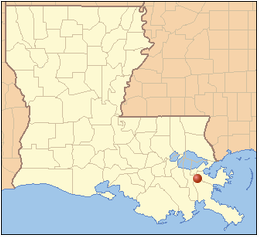| Home | Search | Emissions | Pollutants | About the Database |

Phillips 66 (2418), Belle Chasse
LDEQ Accident Report
| Accident # | 112738 |
| State Police # | 09-00749 |
| Accident Date | 2009-02-13 |
| Report Date | 2009-07-01 |
| Follow-up Date | 0000-00-00 |
| Follow-up: | No |
Pollutants Released
| Pollutant | Duration | Point Source | Greenhouse Gas | Criteria Pollutant | Ozone forming chemical | Amount of Release |
| Carbon Monoxide | 26,460 Minutes | 308F-D-1 (Low Pressure Flare); 1391-FF (1391-PSV-009); 301-D-3 (CO Bypass Vent) | NO | YES | NO | 15,764.0 pounds |
| Hydrocarbon | 26,460 Minutes | 308F-D-1 (Low Pressure Flare); 1391-FF (1391-PSV-009); 301-D-3 (CO Bypass Vent) | NO | NO | YES | 16,742.0 pounds |
| Sulfur Dioxide | 26,460 Minutes | 308F-D-1 (Low Pressure Flare); 1391-FF (1391-PSV-009); 301-D-3 (CO Bypass Vent) | NO | YES | NO | 161.0 pounds |
Accident Classified As:
Cause of Problem: Start Up, Shut Down
During the startup of the FCC Unit following a 36 day refinery maintenance turnaround outage, the unit unexpectedly transitioned to partial-burn combustion in the catalyst regenerator for less than an hour before the bypass vent was closed. Shortly after starting up the Reformer Unit during a test of newly installed burners in heater 1391-H-4, a high concentration of very light material (hydrogen and propane) caused the Depentanizer tower's overhead pressure to rise, resulting in the PSV-009 to relive for approximately 3 minutes. This reduced the pressure and the PSV re-sealed properly. While starting up the Coker Unit, light material in its feed stream from the Crude Unit also caused an unexpected increase in pressure in the suction drum of the compressor which caused the flare valve at the suction drum to open into the low pressure flare. Compressor suction drum pressure was stabilized as feed quality to the Coker Unit improved and the flare valve was closed.
Discharge Preventable - No
"Even though start-up procedures were followed and documented, many of the start-up activities noted in this report were unexpected, infrequent, and unanticipated events."
Notes/Remedial Actions
Operations has developed for its operators responsive drills for rapidly occurring unstable conditions which will eventually help minimize impact of emissions to the environment.

Connect With Us: